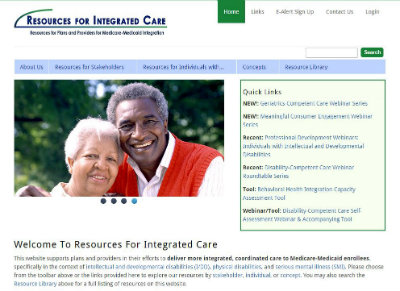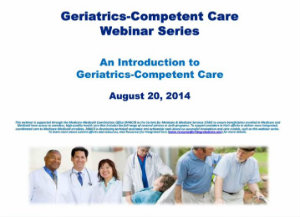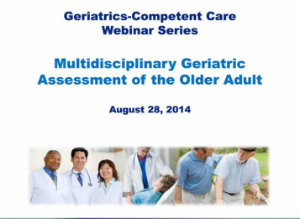 Many of the John A. Hartford Foundation’s grant projects are working hard to improve the quality of health care for the older adults who are dually enrolled in both Medicare and Medicaid.
Many of the John A. Hartford Foundation’s grant projects are working hard to improve the quality of health care for the older adults who are dually enrolled in both Medicare and Medicaid.
As a group, these low-income, older adults have more complex health conditions and a greater need for coordinated, geriatrics-expert care that meets their own individualized health goals.
To improve quality and reduce costs in this population, states are working with the federal government and local managed care health plans to integrate the financing and care delivered through Medicare and Medicaid. Changes are happening fast as states experiment with delivering care to this population of “duals” through these health plans, many of which have never had experience caring for an older adult population with complex conditions.
While some of our duals-oriented projects are focused on developing the right quality measures and others on better enabling social services and wellness/prevention programs to link up with medical systems for this and other populations , our grantee Community Catalyst is working through advocacy.
 Through Community Catalyst’s Voices for Better Health Initiative, coalitions of consumers teamed with geriatrics health professionals are advocating to state Medicaid offices, the federal Medicare-Medicaid Coordination Office, and health plans for the right kind of evidence-based geriatric care that should be delivered.
Through Community Catalyst’s Voices for Better Health Initiative, coalitions of consumers teamed with geriatrics health professionals are advocating to state Medicaid offices, the federal Medicare-Medicaid Coordination Office, and health plans for the right kind of evidence-based geriatric care that should be delivered.
This work is leading to the spread of geriatrics knowledge. With content developed in partnership between Community Catalyst and the American Geriatrics Society, and outreach facilitated by the Lewin Group, the Centers for Medicare and Medicaid Services (CMS) hosted a two-part webinar series that covers the basics of Geriatrics-Competent Care. The two webinars, which reached more than 500 clinicians, administrators, and consumer advocates across the country, are now available for free.
 You can view the “Introduction to Geriatrics Competent Care” and the “Geriatric Assessment” webinars on the Resources for Integrated Care website. You’ll hear from several Hartford grantees representing different professional viewpoints and expertise, and you can download the slides and transcripts of the presentations.
You can view the “Introduction to Geriatrics Competent Care” and the “Geriatric Assessment” webinars on the Resources for Integrated Care website. You’ll hear from several Hartford grantees representing different professional viewpoints and expertise, and you can download the slides and transcripts of the presentations.
We anticipate more of these webinars and other resources geared to caring for the older “duals” population. And we hope you’ll find these tools useful for informing those in your community involved in developing integrated systems of care for this vulnerable population.
This is the 11th in an occasional series. See other Health AGEnda posts on Tools You Can Use:
Tools You Can Use: The Essentials of Cardiovascular Care in Older Adults
Tools You Can Use: Geriatric Transitions Objective Structured Video Examination
Tools You Can Use: A New APProach to Treating Older Patients
Tools You Can Use: Detecting Cognitive Impairment During the Medicare Annual Wellness Visit
Tools You Can Use: Preparing a Personal Advance Care Plan
Tools You Can Use: Guidelines for Assessing Patients Facing Surgery
Tools You Can Use: Principles for Treating Patients with Multiple Chronic Conditions
